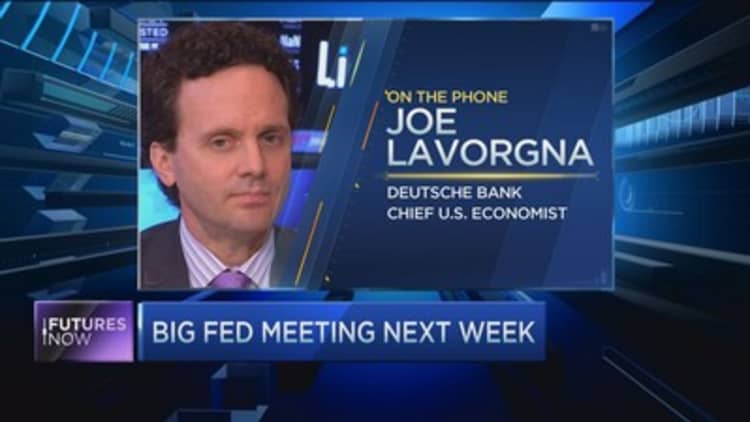
While Wall Street frets about a potential Fed rate hike next week, one prominent economist has a simple message for investors: Relax. Nothing is going to happen.
"I would say in light of a variety of different events, most notably the fragility and volatility in the global equity markets, the Fed is most likely to pass on September," Joe LaVorgna said Thursday on CNBC's "Futures Now." Wild price swings have plagued U.S. equities in the past several weeks, as the market has grappled with heightened volatility.
But rather than push the decision to raise rates for the first time in nearly a decade back to the end of the year, LaVorgna—who believes the Fed missed a prime opportunity to hike in the spring—said it could come sooner than most market watchers think.
Read More No Fed interest rate hike until 2017: Sri-Kumar
"They are going to view [the next month] as a way to see what, if any, negative fallout that the recent market events have had on the broader economy," said Deutsche Bank's chief U.S. economist. "I think October is interesting as a possibility for a hike, as the Fed could very well raise rates next month if economic and financial conditions warrant action."
For LaVorgna, there are a few key factors that need to materialize between now and the end of October in order for the Fed to hike. "Global equity markets need to stabilize," he said. "The S&P 500 has to be up decently, say 5 percent, from its recent 1,868 low and the , currently around 26, needs to go back below 15." Closing at 1,952 on Thursday, the S&P 500 is just under LaVorgna's 5 percent target. The VIX ended the same day at around 24.
In addition to stock market equilibrium, LaVorgna said economic data, such as nonfarm payrolls, retail sales and housing starts, need to remain strong and the , which is up more than 5 percent on the year, needs to stop appreciating.
Read More This is what could tip Fed's hand
"Assuming a majority of [those] conditions were met, we expect an October rate hike to be followed by two more 25 basis point increases at next year's March and June meetings," said the CNBC contributor.
However, if the market turbulence and global worries persist, LaVorgna said there could very well be no hike at all. "They will get worried somewhere down the line that much weaker global growth, with a backdrop of a very strong dollar, will put a brake on economic activity next year and cause inflation to move even lower."



